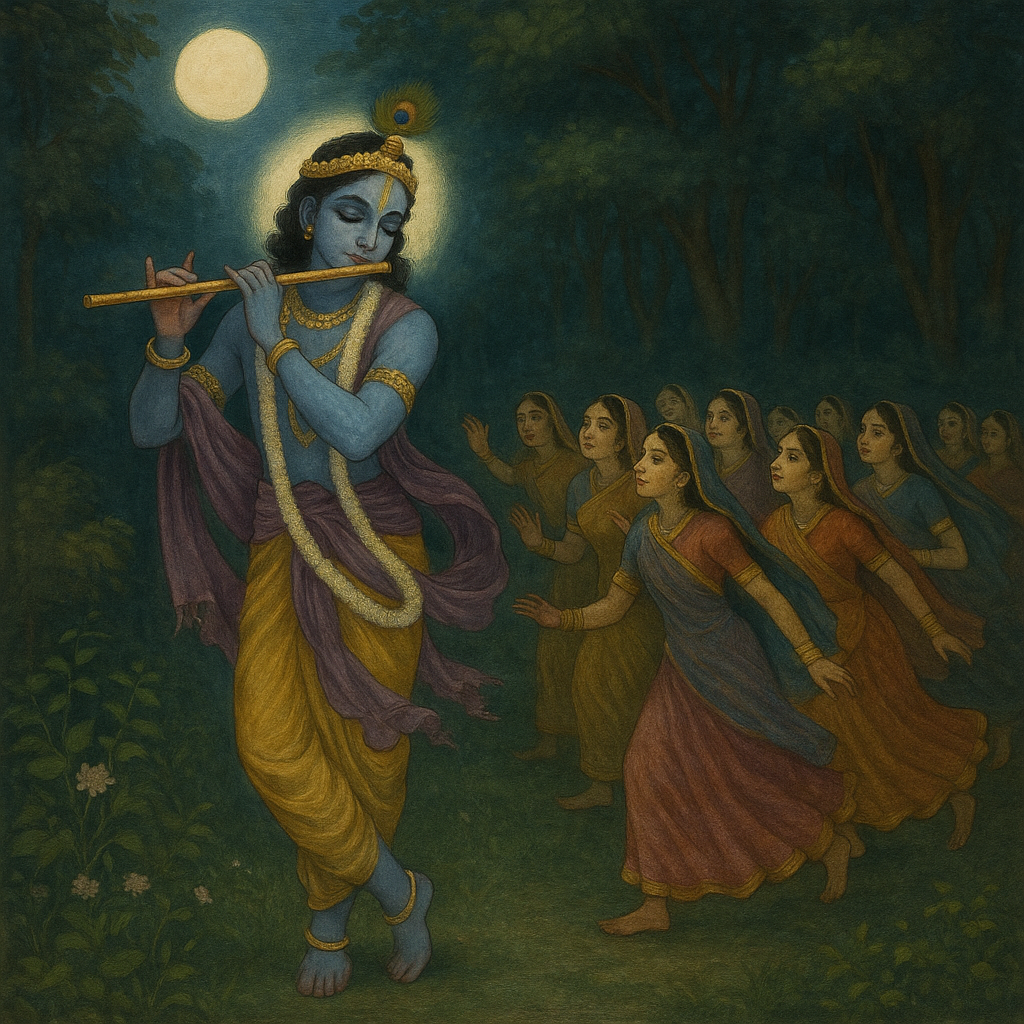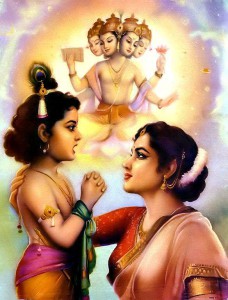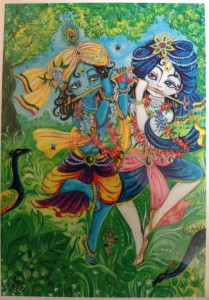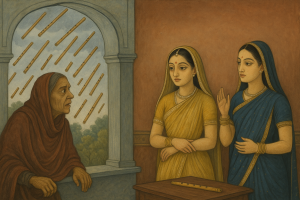(Kṛṣṇa’s Transcendental Experiment with the Flute)
Kṛṣṇa’s Transcendental Intention
One day, Śrī Kṛṣṇa, the Lord of Vṛndāvana and master of divine arts, conceived a new plan. He desired to call the gopīs to Him—not with words or messengers, but with the irresistible melody of His flute. “I shall play such a tune,” He thought, “that will bewilder their hearts and draw them to Me. Especially My Śrīmatī Rādhārāṇī—I must discover the particular notes to which Her heart is most vulnerable.”
The First Melody: The Cows Surrender
Thus, the transcendental experiment began. On the first day, Kṛṣṇa played a tune so sweet and mysterious that His beloved cows abandoned their grazing. They simply stood motionless, eyes fixed upon Kṛṣṇa’s moonlike face, as if drinking its nectar with their eyes while relishing His music with their ears. Not even fresh grass could tempt them now—their only nourishment was the bliss of the Lord’s flute.
The Second Melody: The Forest Falls Silent
On the second day, the forest itself responded. Kṛṣṇa played another enchanting tune. The birds ceased their singing mid-note, and the animals froze where they stood. It was as though invisible cages of divine sound had enveloped them. The entire forest became a silent audience to Kṛṣṇa’s flute, mesmerized and captivated beyond movement or thought.
The Third Melody: The Deer Approach
Next came the third day. A new tune floated from Kṛṣṇa’s lips—gentle, alluring, and tender like the mood of longing. This time the deer, with eyes soft as lotuses, approached Him in great numbers. Enchanted by both the melody and the beauty of Kṛṣṇa’s form, they gazed at Him with affection and reverence, silently offering worship through their tear-filled glances.
The Gopīs Take Notice
The young gopīs of Vṛndāvana were fully aware of Kṛṣṇa’s secret flute experiments. Teasingly, they approached Mother Yaśodā and said, “O noble mother Yaśodā, your son, who is supposed to be a cowherd boy, has now become a great innovator of melodies. Every day He invents new styles of flute-playing, and with each one, He causes even the forest to fall into trance.”
The Fourth Melody: The Celestial Disarray
On the fourth day, Kṛṣṇa’s flute reached the heavens. A melody of such enchanting beauty emerged that it bewildered the minds of the demigoddesses in Svargaloka. So captivated were they by this divine music that their garments loosened and their jeweled ornaments fell, unnoticed, to the ground. Overwhelmed by transcendental attraction, they forgot themselves entirely.
The Fifth Melody: The World Reversed
Then came the fifth melody—so potent that it overturned the laws of nature. All animate beings fainted in ecstasy, losing their external consciousness. Meanwhile, inanimate objects—trees, rocks, and even the dust—appeared to stir, as if imbued with life. Such is the power of Kṛṣṇa’s flute when played with the intention to awaken divine love.
Yamunā Devī’s Response
Although the gopīs remained unaffected, one divine personality could not contain herself. Upon hearing this special melody, Yamunā-devī, the goddess of the sacred river, became overwhelmed. Her waters stopped flowing. Waves swelled, trembling with emotion. Then, shifting her course, she surged toward the source of that melody—Kṛṣṇa Himself—and offered lotus flowers at His lotus feet, surrendering in ecstatic devotion.
Govardhana and the Clouds Listen
Undeterred, Kṛṣṇa continued His divine practice. Every day brought a new tune—some so sweet that even the clouds stood still in the sky, stunned, while Govardhana Hill, His dearmost servant, melted within, unable to resist the nectar of that sound. All of Vṛndāvana vibrated with anticipation, but the gopīs’ hearts still had not been called.
The Longing of the Gopīs
While Kṛṣṇa experimented with melodies, the gopīs were drowning in separation. Their minds were fixed on Him, but they could not hear the right call. In their longing, they appeared so distraught that their in-laws began to suspect madness. “What kind of daughters-in-law have our sons married?” they asked. But how could they understand the madness of divine love?
Śrī Rādhā’s Transcendental Desire
Of all the gopīs, Śrīmatī Rādhikā was the most affected. Her longing for union with Kṛṣṇa reached such an intense state that she began to contemplate becoming a bamboo flute Herself—always in His hands, always at His lips. What form, what existence, could be more blessed than that?
The Perfect Melody Found
And then—on a day soaked in divine destiny—Kṛṣṇa found it. The tune that carried not just notes, but Her name, Her heart, and Her secrets. It was the sound the gopīs had been waiting for. That divine melody finally pierced their souls like a thunderbolt of ecstasy. Hearing it from Vāmśīvaṭa, they abandoned everything—family, duty, even shame—and ran to their beloved.
The Rāsa Līlā: Fulfillment of Divine Longing
And so it was that, on that sacred night, under the full moon at Vāmśīvaṭa, Kṛṣṇa played His flute and the gopīs arrived, their love fully awakened. What followed was the divine rāsa-līlā—the dance of eternal union, the fulfillment of all longing, and the ultimate reward for their unwavering love and surrender.
Lesson to Be Learned: The Heart’s Melody Cannot Be Faked
This līlā teaches that spiritual longing cannot be satisfied by ordinary beauty, power, or talent—not even celestial music is enough. Only when Kṛṣṇa’s call matches the inner vibration of the soul—especially the soul saturated with love like the gopīs—does union become possible. Śrī Rādhā’s yearning shows us that divine love is not passive waiting but active, burning, transformative desire. And the Lord responds not when He is ready, but when we are completely ready—heart open, ego dissolved.
LILA NARATED BY Indradyumna Swami



